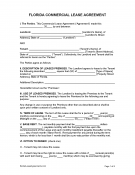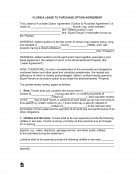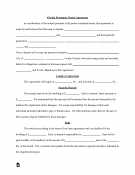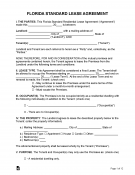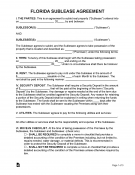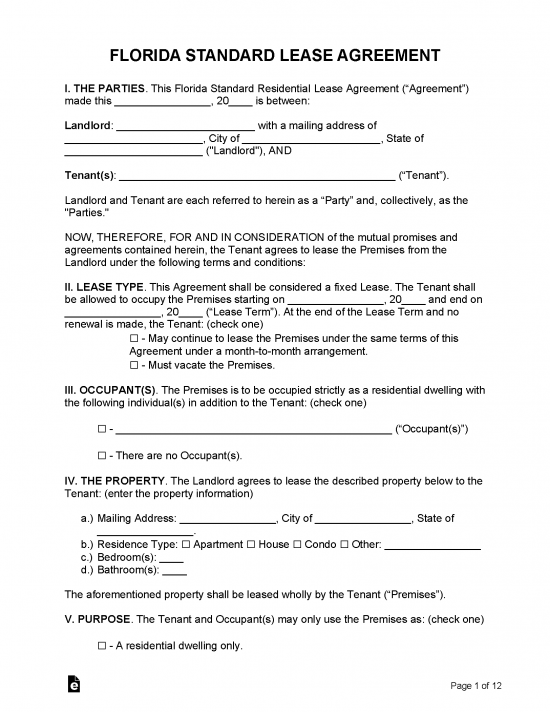Florida lease agreements govern the relationship between a landlord and tenant in the leasing of property in exchange monthly rent. A lease agreement will contain the rent and what duties the landlord owes in exchange, and may contain additional terms in other situations, such as the metering of utilities, or the suitability of pets. Both the landlord and the tenant should keep a copy of the lease agreement, and refer to it in the event of a dispute.
Contents
- Florida Lease Agreements: By Type (6)
- Landlord-Tenant Laws
- Required Disclosures (6)
- Security Deposit Laws
- When is Rent Due? (grace periods)
- Eviction Notice (non-payment)
- Maximum Fees ($)
- Tenant’s Unclaimed Property
- Handbooks and Guides
By Type (6)
- Commercial Lease Agreement
- Month-to-Month Lease Agreement
- Rent-to-Own Lease Agreement
- Roommate Lease Agreement
- Standard Lease Agreement
- Sublease Agreement
Download: Adobe PDF, MS Word, Rich Text Format
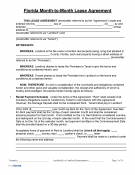 Month-to-Month Lease Agreement
Month-to-Month Lease Agreement
Download: Adobe PDF, MS Word, Rich Text Format
Download: Adobe PDF, MS Word, Rich Text Format
Download: Adobe PDF, MS Word, Rich Text Format
Download: Adobe PDF, MS Word, Rich Text Format
Download: Adobe PDF, MS Word, Rich Text Format
Landlord-Tenant Laws
Statutes – Title 86, Chapter 83, Part II (Residential Tenancies)
Required Disclosures (6)
Identification ( § 83.50(1)) – Owners must list themselves or an authorized agent that is allowed to access the premises in addition to receive notices.
Fire (§ 83.50(2)) – All buildings over three (3) stories high must be notified of any fire protection.
Lead-Based Paint Disclosure – Federal law requiring landlords to complete and provide to a tenant prior to occupancy.
Radon Disclosure – The following must be stated in every Florida lease agreement (§ 404.056):
RADON GAS: Radon is a naturally occurring radioactive gas that, when it has accumulated in a building in sufficient quantities, may present health risks to persons who are exposed to it over time. Levels of radon that exceed federal and state guidelines have been found in buildings in Florida. Additional information regarding radon and radon testing may be obtained from your county health department.
Security Deposit Disclosure – If a security deposit is made part of the lease agreement, the following text must be included in the lease agreement in CAPITAL LETTERS:
YOUR LEASE REQUIRES PAYMENT OF CERTAIN DEPOSITS. THE LANDLORD MAY TRANSFER ADVANCE RENTS TO THE LANDLORD’S ACCOUNT AS THEY ARE DUE AND WITHOUT NOTICE. WHEN YOU MOVE OUT, YOU MUST GIVE THE LANDLORD YOUR NEW ADDRESS SO THAT THE LANDLORD CAN SEND YOU NOTICES REGARDING YOUR DEPOSIT. THE LANDLORD MUST MAIL YOU NOTICE, WITHIN 30 DAYS AFTER YOU MOVE OUT, OF THE LANDLORD’S INTENT TO IMPOSE A CLAIM AGAINST THE DEPOSIT. IF YOU DO NOT REPLY TO THE LANDLORD STATING YOUR OBJECTION TO THE CLAIM WITHIN 15 DAYS AFTER RECEIPT OF THE LANDLORD’S NOTICE, THE LANDLORD WILL COLLECT THE CLAIM AND MUST MAIL YOU THE REMAINING DEPOSIT, IF ANY. IF THE LANDLORD FAILS TO TIMELY MAIL YOU NOTICE, THE LANDLORD MUST RETURN THE DEPOSIT BUT MAY LATER FILE A LAWSUIT AGAINST YOU FOR DAMAGES. IF YOU FAIL TO TIMELY OBJECT TO A CLAIM, THE LANDLORD MAY COLLECT FROM THE DEPOSIT, BUT YOU MAY LATER FILE A LAWSUIT CLAIMING A REFUND. YOU SHOULD ATTEMPT TO INFORMALLY RESOLVE ANY DISPUTE BEFORE FILING A LAWSUIT. GENERALLY, THE PARTY IN WHOSE FAVOR A JUDGMENT IS RENDERED WILL BE AWARDED COSTS AND ATTORNEY FEES PAYABLE BY THE LOSING PARTY. THIS DISCLOSURE IS BASIC. PLEASE REFER TO PART II OF CHAPTER 83, FLORIDA STATUTES, TO DETERMINE YOUR LEGAL RIGHTS AND OBLIGATIONS.
Security Deposit Receipt – After a security deposit has been paid by the tenant, the landlord must notify them within thirty (30) days of where the money is being held and if it is an interest or non-interest bearing account (§ 83.49).
Security Deposit Laws
Maximum Amount ($)
Florida law does not set a limit on the maximum security deposit that a landlord may seek from a tenant.
Returning to Tenant
The landlord must return the security deposit to the last known address of the tenant, plus accrued interest, within fifteen (15) days of the termination of the tenancy. However, if the landlord desires to use a portion of the security deposit to pay for a repair to the unit, the landlord must notify the tenant in writing within thirty (30) days of the termination of the tenancy. This notification should include an itemization of all potential claims on the security deposit. If the tenant objects to any of the landlord’s claims on the security deposit, the tenant has fifteen (15) days after receiving the itemization from the landlord to notify the landlord of an intent to dispute the accounting (§83-49(3)(b)).
When is Rent Due? (grace period)
Landlords and tenants may determine the date and location at which rent is due. Florida law does not include a grace period.
Eviction Notice (non-payment)
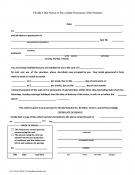 3-Day Notice to Pay or Quit – If the tenant does not pay rent on the day it is due and for three subsequent days, not including holidays and weekends, the landlord may initiate proceedings to terminate the lease, including posting this notice on the property. (§ 83.56(3)).
3-Day Notice to Pay or Quit – If the tenant does not pay rent on the day it is due and for three subsequent days, not including holidays and weekends, the landlord may initiate proceedings to terminate the lease, including posting this notice on the property. (§ 83.56(3)).
Download: Adobe PDF
Maximum Fees ($)
Late Rent Penalties
Florida law does not set a maximum late fee level. However, late fees should be included in the rental agreement if the landlord intends to charge one. Even if a late fee is included, a court will not enforce the fee if it is unconscionable (§83.45).
NSF Checks
In the event a tenant provides a rent check without sufficient funds to cover the amount owed, the landlord may collect an amount equal to whatever bank fees the landlord actually incurred as a result of the faulty payment, plus a service charge of $25 if the face value does not exceed $50; $30 if the face value exceeds $50 but does not exceed $300; $40 if the face value exceeds $300; or five (5) percent of the face value of the payment instrument, whichever is greater (§ 68.065).
Tenant’s Unclaimed Property
When a landlord encounters property left in a unit after the termination of a tenancy, the landlord must notify the tenant believed to be the owner of the property. The tenant must respond within fifteen (15) days of the postage date of the landlord’s written notice. While awaiting a response from the tenant, the landlord has a duty to take reasonable care of the tenant’s property and must store it in a place of safekeeping. If the tenant does not respond to the landlord within the designated time, the landlord may sell the left-behind items in a public sale, and use the proceeds to pay the storage cost. If the items are sold, the landlord must mail whatever proceeds remain to the tenant within thirty (30) days of the sale (§ 715.109).
